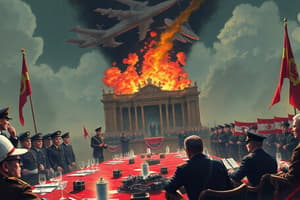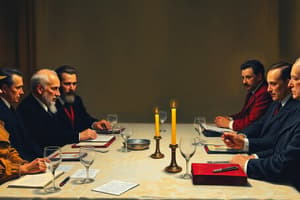Podcast
Questions and Answers
What was the Yalta Conference?
What was the Yalta Conference?
The Yalta Conference was a meeting held during World War II from February 4 to February 11, 1945, by the heads of state of the Allied nations (Stalin, Roosevelt, and Churchill) to plan the occupation of post-war Germany.
What was the state of Europe during the time of the Yalta Conference?
What was the state of Europe during the time of the Yalta Conference?
When the Yalta Conference was held, WWII was nearing an end, with Germany on the verge of an unconditional surrender and Japan fighting defensively.
What happened after the Yalta Conference?
What happened after the Yalta Conference?
Following the Yalta Conference, the Allies finished their invasion of Germany, and in July 1945, the United States dropped an atomic bomb on Japan.
When was the Potsdam Conference?
When was the Potsdam Conference?
Who was one notable person missing from the Potsdam Conference?
Who was one notable person missing from the Potsdam Conference?
What were the changes in leadership prior to the Potsdam Conference?
What were the changes in leadership prior to the Potsdam Conference?
What were the goals of the Potsdam Conference?
What were the goals of the Potsdam Conference?
What were the results of the Potsdam Conference?
What were the results of the Potsdam Conference?
What happened a day after the Potsdam Conference began?
What happened a day after the Potsdam Conference began?
Was there tension in the allied camp after Potsdam, and if so, why?
Was there tension in the allied camp after Potsdam, and if so, why?
What was the Curzon line?
What was the Curzon line?
What was the Molotov-Ribbentrop Pact?
What was the Molotov-Ribbentrop Pact?
What was the western reaction to the Molotov-Ribbentrop Pact?
What was the western reaction to the Molotov-Ribbentrop Pact?
What was the connection of the Molotov-Ribbentrop Pact to the start of the Cold War?
What was the connection of the Molotov-Ribbentrop Pact to the start of the Cold War?
What happened post-1938 regarding Germany's demands for concessions from Czechoslovakia?
What happened post-1938 regarding Germany's demands for concessions from Czechoslovakia?
What was the reaction to Germany's demands?
What was the reaction to Germany's demands?
What were the great purges?
What were the great purges?
What was the western reaction to the great purges?
What was the western reaction to the great purges?
Flashcards
Yalta Conference
Yalta Conference
Conference held February 4-11, 1945, involving Stalin, Roosevelt, and Churchill to plan the post-war era.
Potsdam Conference
Potsdam Conference
Conference held in Potsdam, Germany, from July 16 to August 2, 1945, to establish post-war order.
Curzon Line
Curzon Line
Established border between Poland and the USSR, decided during the Yalta Conference.
Molotov-Ribbentrop Pact
Molotov-Ribbentrop Pact
Signup and view all the flashcards
Munich Agreement
Munich Agreement
Signup and view all the flashcards
Great Purges
Great Purges
Signup and view all the flashcards
Stable Post-War Germany
Stable Post-War Germany
Signup and view all the flashcards
Free Elections in Poland
Free Elections in Poland
Signup and view all the flashcards
United Nations Setup
United Nations Setup
Signup and view all the flashcards
Atomic Bomb Test
Atomic Bomb Test
Signup and view all the flashcards
Distrust of Stalin
Distrust of Stalin
Signup and view all the flashcards
Western Betrayal
Western Betrayal
Signup and view all the flashcards
Cold War Impact
Cold War Impact
Signup and view all the flashcards
Resisting German Demands
Resisting German Demands
Signup and view all the flashcards
Germany's Concessions
Germany's Concessions
Signup and view all the flashcards
Western Trust of USSR
Western Trust of USSR
Signup and view all the flashcards
Study Notes
Yalta Conference
- Held from February 4-11, 1945, by leaders Stalin, Roosevelt, and Churchill.
- Planned the post-war occupation of Germany.
State of Europe During Yalta
- WWII was nearing its end, with Germany about to surrender unconditionally.
- Japan was in a defensive position.
Aftermath of Yalta Conference
- Allies completed their invasion of Germany.
- In July 1945, the U.S. dropped an atomic bomb on Japan.
Potsdam Conference
- Took place from July 16 to August 2, 1945, in Potsdam, Germany.
Leadership Changes Prior to Potsdam
- President Roosevelt died on April 12, 1945, missing Potsdam.
- Clement Attlee became British Prime Minister following election.
Goals of the Potsdam Conference
- Establish a stable post-war Germany.
- Organize free elections in Poland.
- Set up the United Nations after League of Nations failure.
Results of the Potsdam Conference
- Achieved all set goals, including Poland's political arrangements.
Atomic Bomb Test
- The day after Potsdam began, the U.S. successfully tested its first atomic bomb.
Tensions Post-Potsdam
- Tensions arose among allies due to decisions on USSR reparations.
- Attlee and Truman distrustful of Stalin's intentions for Poland, suspecting pro-communist government setup.
Curzon Line
- Established border between Poland and the USSR during the Yalta Conference.
Molotov-Ribbentrop Pact
- Non-aggression pact between Nazi Germany and the Soviet Union, agreeing to remain neutral against third parties.
Western Reaction to the Pact
- Anger and feelings of betrayal in the West, viewing it as confirmation of Soviet duplicity.
Impact of the Molotov-Ribbentrop Pact on Cold War Relations
- Severed relations between the capitalist West and communist Russia, worsening over the preceding 20 years.
Events Following 1938 Demands from Germany
- USSR aimed to resist German demands; Britain and France, fearing war, agreed to concessions.
- The Munich Agreement met all German demands, securing Germany's favorable position.
Reaction to Germany's Concessions
- Germany's position strengthened, revealing Western powers' fears.
- Strained relations between Western powers and Russia due to lack of consultation.
Great Purges in Soviet Union
- Occurred from 1936 to 1938, resulting in execution and trials of Soviet leaders for alleged Nazi collaboration.
Western Reaction to Great Purges
- Western nations questioned the trustworthiness and stability of the Soviet regime due to brutal internal repression and loss of leadership.
Studying That Suits You
Use AI to generate personalized quizzes and flashcards to suit your learning preferences.




